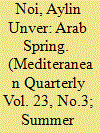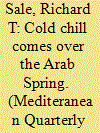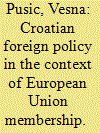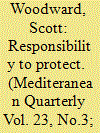|
|
|
Sort Order |
|
|
|
Items / Page
|
|
|
|
|
|
|
| Srl | Item |
| 1 |
ID:
117822


|
|
|
|
|
| Publication |
2012.
|
| Summary/Abstract |
The popular uprising that started in Tunisia in December 2010 quickly spread across the Arab world, culminating in a historic regional realignment with far-reaching implications. This essay details the implications of the Arab Spring for Israeli security. After highlighting the history of Israel's defense strategy and reviewing the Arab Spring revolts, the authors find that the recent uprisings exacerbate several issues faced by Israel, including geopolitical relations with other countries in the region, energy issues, and growing threats presented by nonstate actors.
|
|
|
|
|
|
|
|
|
|
|
|
|
|
|
|
| 2 |
ID:
117824


|
|
|
|
|
| Publication |
2012.
|
| Summary/Abstract |
In this article, Turkey's and the European Union's foreign policy approaches to the Middle East and North Africa region are analyzed by focusing on "normative power" and "soft power" concepts, the historical relations among the countries of the region, and the projects developed by the EU and Turkey. The Arab Spring and its repercussions on the EU's and Turkey's foreign policy approaches to the region, along with a brief historical background of the Turkey-EU relationship, are evaluated in order to determine whether Turkey should coordinate its foreign policy with the EU.
|
|
|
|
|
|
|
|
|
|
|
|
|
|
|
|
| 3 |
ID:
117823


|
|
|
|
|
| Publication |
2012.
|
| Summary/Abstract |
Islam is on the march in the Middle East. For the past few years, in every Mideast election, the Islamic parties have won: in the Gaza Strip in 2006 and in Iraq and Tunisia in 2010. In 2011, they won again in Turkey and Morocco, and in Egypt the Islamist parties confirmed an overwhelming victory in the first parliamentary elections since the overthrow of Hosni Mubarak. The Muslim Brotherhood won the biggest share with the hard-line Salafist al Nour Party of Light. The youth groups that staged the demonstrations that toppled Mubarak took only seven seats. What are the implications for US policy and its ideals of self-determination and human rights? Will the liberals triumph, or will the Egyptian people face a hard-line Islamic future? This article attempts to answer these questions.
|
|
|
|
|
|
|
|
|
|
|
|
|
|
|
|
| 4 |
ID:
117819


|
|
|
|
|
| Publication |
2012.
|
| Summary/Abstract |
In this essay, Croatia's minister of foreign and European affairs outlines Croatia's foreign policy directions as a member of the European Union. Mutual benefits to the EU and Croatia of the latter's membership are outlined, with particular reference to issues in southeastern Europe and with countries along the southern Mediterranean shoreline. The membership process itself is described as a driver in the development of Croatia's foreign relations.
|
|
|
|
|
|
|
|
|
|
|
|
|
|
|
|
| 5 |
ID:
117826


|
|
|
|
|
| Publication |
2012.
|
| Summary/Abstract |
Entrepreneurship represents a very important element in the sustainable development of a country's economy and becomes more complex when viewed from the angle of migration, which affects nearly all countries whether they are a place of origin, transit, destination, or a combination of these. Utilizing survey data, this essay attempts to identify the key factors explaining the entrepreneurial initiatives of immigrants in Greece. It reviews the literature of immigrant entrepreneurship and gives an overview of immigration and the profile of immigrants in the country. The essay ends with some conclusions about the findings and suggests future implications.
|
|
|
|
|
|
|
|
|
|
|
|
|
|
|
|
| 6 |
ID:
117820


|
|
|
|
|
| Publication |
2012.
|
| Summary/Abstract |
War frequently leads to large increases in taxes, regulation, and government spending-both for the military and ostensibly unrelated domestic programs. Conservatives should not ignore that war is the most prominent cause, directly or indirectly, of the massive welfare state that has been erected in the United States. Many conservatives today might argue that despite the conflict-induced ill effects of ballooning government, war is sometimes necessary for US security. However, this analysis shows that even most of the nation's big wars were unneeded, foolish, or counterproductive-particularly the post-World War II prosecution of small imperial brushfire wars and nation building.
|
|
|
|
|
|
|
|
|
|
|
|
|
|
|
|
| 7 |
ID:
118583


|
|
|
|
|
| Publication |
2012.
|
| Summary/Abstract |
Having previously applied the concept of pragmatic idealism to the "like-minded middle powers" during the Cold War, the author now aims to extend its application to great powers and even superpowers. This essay challenges the stereotypical realist conception of Russia's Cyprus policy, demonstrating that, besides its pragmatic features, it reveals idealistic motives, especially since 1991. These motives issue from a rich nexus of historical, religious, and cultural bonds, resulting in support for essentially idealist legal norms and ethical values that defend the rights of the Republic of Cyprus. Moreover, since President Barack Obama's worldview is widely, and properly, perceived to exhibit pragmatic idealism, it should follow that Washington's own Cyprus policy should be refashioned along such principled lines.
|
|
|
|
|
|
|
|
|
|
|
|
|
|
|
|
| 8 |
ID:
117825


|
|
|
|
|
| Publication |
2012.
|
| Summary/Abstract |
This essay examines the theory of responsibility to protect, particularly as it clashes and melds with the concept of state sovereignty. The shift in focus takes center stage and highlights the progression of the premise that states everywhere are responsible for ensuring that mass atrocities against civilians do not occur, and culpable if they do.
|
|
|
|
|
|
|
|
|
|
|
|
|
|
|
|
|
|
|
|
|